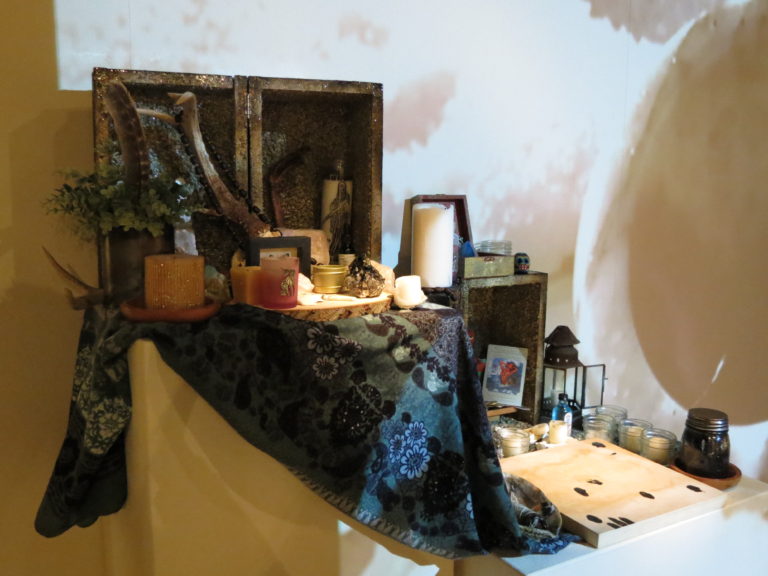Until Feb. 14, visitors to the Morlan Gallery can view an exhibition titled “Black Bone,” named after the Affrilachian Poets’ first anthology of poems. On Thursday, Jan. 19, the exhibition held an opening reception at 6 p.m. in Carrick Theater where the Affrilachian Poets read their poetry – shared through Facebook Live on Transy’s Facebook page – followed by a gathering in Morlan from 7:30-9 p.m.
“We’ll have music, we’ll have light hors d’oeuvres, it will be a total celebration, it will be a lot of fun.” said Morlan Gallery Director Andrea Fisher about the reception.
“About 18 months ago, Jeremy Paden, who is also an Affrilachian Poet, made me aware that they were going to be releasing a book titled “Black Bone” in celebration of their 25th annivervsary, their first anthology of poetry and, you know, it was his very good idea to have an exhibition that would revolve around this, you know mainly looking, listening to the voices, the experiences of people of color around the Appalachian Mountain chain,” said Fisher about the idea behind creating this exhibition.
According to Spanish professor and Affrilachian Poet Jeremy Paden, “The term ‘Affrilachia’ was originally coined by Frank X Walker. In reference to the region of Appalachia, a mountain range stretching over thirteen states along the East Coast of the U.S. from Mississippi to New York, Affrilachia is an ever-evolving cultural landscape poised to render the invisible visible.”
Walker wrote the “Unlearn Fear and Hate” poem which inspired Dr. Kremena Todorova and Professor Kurt Gohde’s “Unlearn Fear + Hate” campaign and artwork, and he will be one of the poets taking part in the readings and attending the reception Thursday evening.
Fisher explained that the hopes for this exhibit are that it will change a perception that has been placed on the Appalachian which isn’t entirely true.
“Many people think ‘oh, poor white people’. Well, there is a rich cultural tradition of many people in the Appalachian Mountains and we want those voices heard. There are rich cultural contributions in the arts that are phenomenal—music, crafts, writing—and maybe not all those voices are heard,” said Fisher.
Each of the artists currently being represented in the Gallery were discovered with the help of Marie Cochran, an art scholar who, after meeting Frank X Walker, started working to create a cohesive list of who is considered an Affrilachian artist. When curating the “Black Bone” exhibit, Fisher used this list to invite artists to participate along with looking to the local talents in Lexington. Overall there are artists from Kentucky, South Carolina, North Carolina and Ohio represented in the exhibition.
“Unlike the Affrilachian Poets, which is a very strictly defined group of poets and writers, the Affrilachian Visual Artists are not necessarily a defined group; it’s not by invitation only or anything like that. This is a group that’s amorphous of people cycling in and cycling out,” said Fisher who credits the creation of the group to Cochran.
Paden explained that “Since 1991, the Affrilachian Poets have been writing together, defying the persistent stereotype of a racially homogenized rural region.”
Fisher hopes that the exhibition will help to change the popularly held ideas surrounding the Appalachian areas and to realize that it is more than how it is usually portrayed.
“I think that the more we expose ourselves to different kinds of people, people who are different from the kinds of folks we grew up with, the more understanding, the more compassionate, the wiser we become and what better way than the arts, right? I think that seeing an exhibition is arguably a way to unlearn fear and hate,” Fisher said.
Fisher encourages those visiting the exhibit to search Affrilachian Poets on YouTube which has videos that can give visitors a better idea about the group and their mission before seeing the exhibit. She also encourages students to use Transy’s Lib Guides which have work from all of the Affrilachian Poets. If any visitor posts about the Gallery on Instagram, Fisher hopes that they will tag @morlangallery.
In addition to the artwork in the exhibit, cartographer Laura Greenfield created an interactive map of the Affrilachian Poets and where they are from in the Appalachian area. The map will be accessible at the exhibit but can also be viewed here.














